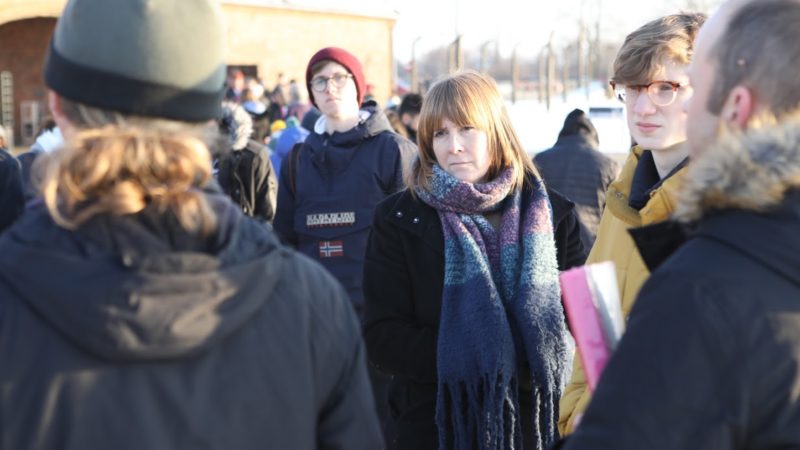Last week I had the honour of visiting Auschwitz with a plane-load of school children from across London, including my constituency in Croydon. At the end of our harrowing but life-affirming trip, one of the pupils said to me that a visit to Auschwitz should be a compulsory part of the school curriculum. He has a point.
We should all know more about the most evidenced genocide in history. Of the 13 million Jews in Europe, six million were murdered in the Second World War. Millions of others as well were dehumanised and murdered in the concentration camps – from gypsies to homosexuals, from intellectuals to Jehovah’s Witnesses.
Jews were rounded up across Europe and transported to the camps at Auschwitz. Often completely unaware of their fate, they carried possessions with them in labelled suitcases. One of the most poignant sights from our visit was the number of house keys that people had brought with them – clearly with a hope that they could one day return to their homes.
On arrival, after days crammed on a train with no food or drink, the Jews were lined up and separated. Women and children were sent one way – mostly straight to the gas chambers. They were stripped naked and their hair was shaved off, to be sold to German companies making equipment for the war effort.
Men who were judged by the doctors to be strong enough to work were sent to become prisoners and put to hard labour. Most died within days or weeks from the cold, hunger or disease. The bitter cold that I felt in Auschwitz Birkenau this week easily penetrated my thick winter clothes. Prisoners had nothing but thin, striped uniforms, marked with a symbol to identify their type of ‘undesirable’. They slept in cold barns; many simply froze to death.
The most extraordinary part of this mass murder was its efficiency and the thousands of people complicit in its operation. Those who booked the trains that brought the victims to their death. The drivers of the trains. The people who made the uniforms and tattooed numbers on the prisoners. The guards who shot the prisoners as they became too weak to work, and those who dropped gas pellets into the death chambers.
The first commandant at Auschwitz, Rudolf Höss, lived in a house at the camp with his wife and children. The family talked afterwards about this being a golden period of happiness. This loving father spent his days competing with other camps for the prize of the highest number of deaths. Then he went home to kiss his children.
How could all these people who loved their families and were previously decent, law-abiding citizens, become complicit in mass murder? The answer is what lies at the heart of our fight against antisemitism and racism of all kinds today. As Primo Levi said: “It happened, therefore it can happen again. This is what we have to say.”
Genocides never take place overnight. First there must be a normalisation of abuse, a dehumanisation of groups of people, a culture of blame against those deemed too successful, too criminal, or just too other. This normalisation is still alive and kicking across the globe today. And with it comes a rise in antisemitism. Tired tropes have become normalised as we turn a blind eye to the borderline racists and enable the hardcore to emerge more confident.
If you look at the data on online abuse, the spikes in antisemitism are extraordinary. Every time a prominent Jew like Luciana Berger speaks, every time Tottenham play football, every time Israel is in the news. The far right and the hard left unite in their hatred. As a result, many people who are neither right nor left absorb these messages and come to believe the lies – that the Holocaust didn’t happen, that Jews secretly run the world, or that blame for the actions of the Israeli government somehow lies with all Jews.
Wrapped around the horrors of Auschwitz are the stories of defiance and humanity from those prisoners who never gave up hope. Secretly writing letters documenting the horror to make sure the world knew what they suffered. Washing their faces in cold water every day to retain one small act of dignity and defy their captors attempts to make them nothing but animals. Protecting their fellow men in a climate where fighting over shoes or food was inevitable, as it could mean prolonging your life for a day or two.
It’s those small acts of humanity in the middle of hell that give us hope for the future. Because just as hate feeds off racism, hope grows from acts of defiance. What harm an antisemitic tweet? What harm an abusive email? Well, we know from the Holocaust where enabling leads. Our social norms shift, and the moral frame of a nation tilts, and the world becomes a more dangerous place. As Obama said when he walked the camps of Auschwitz: “When any Jew anywhere is targeted just for being Jewish, we all have to respond, ‘we are all Jews’.”
By Sarah Jones
Sarah Jones is MP for Croydon Central.
By Sarah Jones
Sarah Jones is MP for Croydon Central.


No comments:
Post a Comment